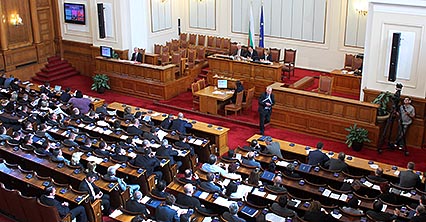News
Law provisions passed at first reading ban offshore companies from participation in privatization transactions and public procurement tenders
20/11/2013
 The Offshore Act that had just passed at first reading in parliament regulates the economic and financial relations of the state with companies registered in jurisdictions with preferential tax treatment and prevents offshore companies from participating in privatization transactions and public procurement tenders, in tenders for concessions. These companies will not be able to acquire assets owned by the state or municipalities, will not be granted licenses to establish credit, insurance or gambling institutions, retirement and health insurance funds, mobile, radio and television operators etc. Movers of the bill are lawmakers from Movement for Rights and Freedoms, Yordan Tsonev and Delian Peevski. Yordan Tsonev explained in the plenary that the prohibitions cover twenty fields of economic activity. The bill bans an entity, registered in a jurisdiction with preferential tax treatment, to create or acquire assets in a publishing house of printed periodicals. The bill envisages measures against aggressive tax planning and avoidance of tax payment. As long as the lawmaker is aware that tax evasion could occur through deals with locally registered natural persons or legal entities, the law covers all transactions that aim to hide taxes. The bill envisages fines of BGN 10 000 to 50 000 for forged documents, for a second offence from BGN 250 000 to 500 000. The restrictions will not apply when the managers of the company could prove it shares are listed on the stock markets of Bulgaria or in another member- state of the European Union. The rules of the new act will not apply to companies licensed as investment funds or such part of economic group which parent company is treated as local person for tax purposes in a country with which Bulgaria has agreement for avoidance of double taxation, or agreement for exchange of information. The ban also does not apply to a company that is part of an economic group, the parent company or the subsidiary of which is a local Bulgarian entity and his real owners, natural persons, are known. The law is to take effect as of 1 January 2014.
The Offshore Act that had just passed at first reading in parliament regulates the economic and financial relations of the state with companies registered in jurisdictions with preferential tax treatment and prevents offshore companies from participating in privatization transactions and public procurement tenders, in tenders for concessions. These companies will not be able to acquire assets owned by the state or municipalities, will not be granted licenses to establish credit, insurance or gambling institutions, retirement and health insurance funds, mobile, radio and television operators etc. Movers of the bill are lawmakers from Movement for Rights and Freedoms, Yordan Tsonev and Delian Peevski. Yordan Tsonev explained in the plenary that the prohibitions cover twenty fields of economic activity. The bill bans an entity, registered in a jurisdiction with preferential tax treatment, to create or acquire assets in a publishing house of printed periodicals. The bill envisages measures against aggressive tax planning and avoidance of tax payment. As long as the lawmaker is aware that tax evasion could occur through deals with locally registered natural persons or legal entities, the law covers all transactions that aim to hide taxes. The bill envisages fines of BGN 10 000 to 50 000 for forged documents, for a second offence from BGN 250 000 to 500 000. The restrictions will not apply when the managers of the company could prove it shares are listed on the stock markets of Bulgaria or in another member- state of the European Union. The rules of the new act will not apply to companies licensed as investment funds or such part of economic group which parent company is treated as local person for tax purposes in a country with which Bulgaria has agreement for avoidance of double taxation, or agreement for exchange of information. The ban also does not apply to a company that is part of an economic group, the parent company or the subsidiary of which is a local Bulgarian entity and his real owners, natural persons, are known. The law is to take effect as of 1 January 2014.

Latest news
- 22/04/2021
The Parliament imposed a moratorium on concessions, real estate deals and appointments pending the election of a new cabinet or caretaker government - 16/04/2021
By 156 votes “in favour”, the National Assembly accepted the resignation of the Council of Ministers with Prime Minister Boyko Borisov - 15/04/2021
Speech by Mrs. Iva Miteva upon her election as a President of the 45th National Assembly - 15/04/2021
The Member of Parliament Iva Miteva was elected President of the 45th National Assembly - 15/04/2021
The Members of the 45th National Assembly were officially sworn in - 03/03/2021
The President of the National Assembly Tsveta Karayancheva and MPs attended the solemn fireworks-retreat on the occasion of the Liberation of Bulgaria - 03/03/2021
Every Bulgarian should preserve and honour the memory of those glorious ancestors, thanks to whom Bulgaria exists today, said the President of the National Assembly Tsveta Karayancheva in Gabrovo - 03/03/2021
Today we are on Shipka to pay our respects to all the heroes who sacrificed their lives for freedom, said the President of the National Assembly Tsveta Karayancheva after climbing Shipka Peak together with young people from all over the country - 02/03/2021
The Vice-President of the National Assembly Valeri Simeonov received an award from the Bulgarian Republican Self-Government in Hungary - 26/02/2021
The Parliament adopted at second reading amendments to the Measures Against Money Laundering Act
 Български
Български English
English